The “Crow Lane chase” began shortly before 9pm on the evening of Friday, October 22 1971, when I was relaxing in the living room of my apartment on the top floor of Broadway House which is located on the northern side of Crow Lane just east of the Hamilton City limits.
I had just showered and was dressed only in my underpants when I heard muffled banging sounds which seemed to be coming from a narrow gap separating Broadway House from the adjacent three-story Purvis’ food distributors warehouse with a service yard off Seon Lane, which was running north-south off Spurling’s Hill. The noises sounded like someone was attempting to dislodge the wooden shutters on the upper floors of the warehouse building. It was a clear night, well after darkness had fallen, and there was no wind which might otherwise have rattled the blinds causing the noise.
 Crow Lane from its western junction with Seon Lane to Lane Hill
Crow Lane from its western junction with Seon Lane to Lane Hill
At that moment my fiancée entered the living-room and told me she had just seen, through the unlit bedroom window, a pair of white sneakers climbing up a horizontal fall-pipe attached to the wall of the three-story warehouse building which gave easy access to the warehouse windows along that wall. Believing there was criminal activity afoot I quickly whispered to my fiancée to dial 999, identify herself and me, and tell the operator what she had seen; also saying that I was asking for police vehicles to be sent on a silent approach – one to the Spurling’s Hill junction with Cavendish Road and another to the southern end of Seon Lane at its junction with Front Street at Crow Lane. I told her to tell them I had left the rear door of the apartment in pursuit of the climber.

Dressed only in my underpants, I immediately exited the rear apartment door which opened into a small enclosed garden. I looked directly upwards from the garden area along a narrow gap between the two buildings where I could see the figure of a man in a crouched position, clinging to a window air-conditioning unit of the warehouse. He looked down at me in the garden and then started to climb higher up the now vertical fall-pipe. I saw him disappear from view onto the warehouse roof some 30 feet above me heading south.
I ran north from the garden area and climbed onto Spurling’s Hill proper and then, turning west, I ran a short distance before turning left onto Seon Lane (which has since disappeared). I ran south down Seon Lane to its junction with Crow Lane, and I saw the offender drop down off a warehouse drainpipe onto the Crow Lane sidewalk beside my parked private car. Again, he saw me and immediately ran east along Crow Lane. The chase was on! I hoped the city duty patrol vehicle was on its way from Hamilton station and a police vehicle was taking up a position at the then ‘stop’ sign junction at the western end of Cavendish Road.
Despite being barefooted and dressed only in my underpants, I sprinted after the suspect as he ran eastward along Crow Lane, crossing the junction at the bottom of Spurling’s Hill towards its junction with Lane Hill. During the chase we were both running alongside and in-between vehicles travelling into and out of the city along the then two-lane road artery into Hamilton. I recall touching oncoming vehicles as we weaved our way between them along the main road. I slowly gained on the offender as we approached the Lane Hill junction with Crow Lane where he suddenly diverted into the entrance leading into the [then] Crow Lane bus garage where most of the Island’s buses were parked overnight.
Just inside the bus depot entrance but before he reached the lined-up parked buses the offender slowed considerably and I jumped on top of him from behind bringing him to the ground.
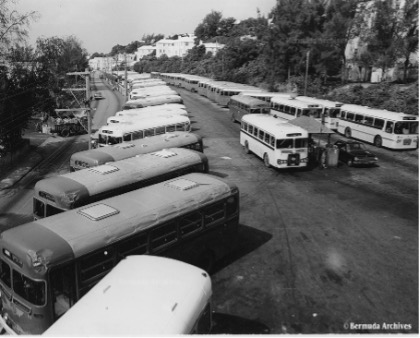
He was clearly exhausted and breathing hard as he squirmed aimlessly on the ground. I kept my weight on him as I heard police sirens approaching – always a nice sound to hear when you’re in trouble! Constables Doug Victor and Mike Walker arrived in a police kombi and assisted in the arrest during which the offender repeated many times the words “I’m sorry. I’m sorry. I’m sorry.”
He had been carrying a screwdriver which, in a later confession, he admitted using when trying to prize open the warehouse shutters.
When further searched at the station he was found to be in possession of just 8 cents.
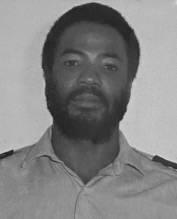 P.C. Douglas "Doug" Victor
P.C. Douglas "Doug" Victor
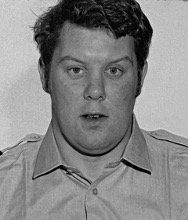 P.C. Michael “Ironsides” Walker
P.C. Michael “Ironsides” Walker
As a result of the barefoot sprint of about 200 yards, which had involved twists and turns along the tarmac road to avoid traffic in both directions, I had rather badly blooded the toe pads on both feet. I couldn’t walk without leaving bloody footprints. I was taken by police car to the nearby King Edward VII Hospital and although I’d felt no pain during the pursuit it then seemed to come on suddenly.
I recall being pushed in a wheelchair into the emergency department with towels wrapped around both feet. After treatment I was placed on recovery leave for eight days.
The offender was identified as 21 year old Marvin Edwin Seaman who had hitherto been unknown to Police. He was living with his Canadian fiancée in an apartment on Cedar Avenue and he quickly became the principal suspect in a number of outstanding shop break-ins in the City and Crow Lane area.
He remained in police custody over the weekend and on Monday he appeared in plea court charged with attempting to break and enter the Purvis warehouse on Spurling’s Hill on the previous Friday night. He pleaded guilty, and the Wor. Mr. Lownie stood the case over until November 8 to hear the results of a probation report.
On November 8, 1971, Seaman again appeared before the Wor. R.H. Lownie and received a 12-month conditional discharge as punishment for attempting to break and enter the Purvis Ltd. Warehouse. His counsel, Miss Shirley Simmons, told the court of Seaman’s home environment and taking this into consideration, the magistrate granted him the conditional discharge.
Following his conviction I was awarded a Commissioner’s Commendation by COP George Duckett “for zeal and initiative displayed on 22nd October 1971, resulting in the arrest of a man for attempted breaking and entering of a warehouse.”
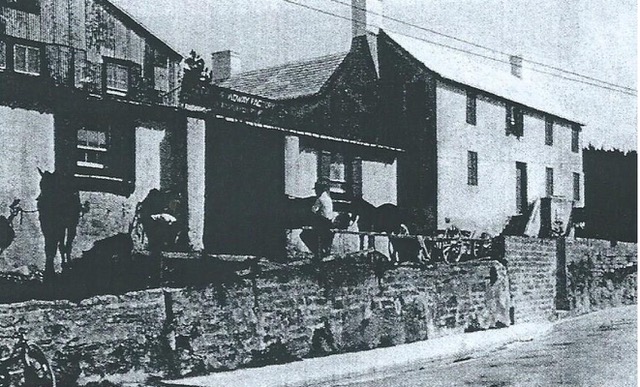 Broadway House, far right, as it was in 1931
Broadway House, far right, as it was in 1931
Notes about the history of Broadway House
2. Broadway House, built in the 1740’s, is located on Crow Lane, Hamilton, Bermuda. It is an historically significant building with a fascinating past which has a rich history. Over the years, it has served various purposes:
In 1938, architect Bayfield Clarke and his wife, an interior designer, transformed Broadway House into “one of the showplaces of Bermuda.”
In 2007, however, the government removed its Grade One historic building listing, leading to concerns among conservationists that it might be demolished for office space. The decision to delist the building came after the owner claimed a lack of on-site parking which hindered renting the property
This historic gem, once a bustling bakery and a discreet brothel, now awaits its next chapter.
Current Status: Broadway House is now up for sale, priced at $1,795,000. It offers potential for either residential or commercial use.
Seon Lane, at that time ran north to south along the western edge of this blacksmith business which was later demolished whereupon the land was occupied by Purvis’ Warehouse.
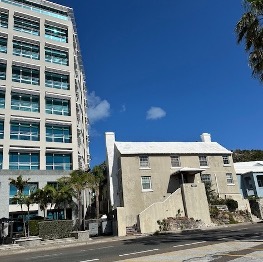
Removal of Seon Lane
Regarding the “re-positioning” of Seon Lane, the Royal Gazette reported as follows in an article published on January 19, 2007:-
Additional complaints were lodged with the Department of Planning by stakeholders concerned that a promise to maintain a public throughway would be overlooked.
"An agreement was made between the applicant and the Corporation of Hamilton to move Seon Lane to the western limit of the property, thereby increasing the utility of the lot. It is our understanding that this is a private agreement, but never the subject of a registered plan of subdivision. It is our understanding that the lane can only be moved and the title deeds amended in accordance with a registered plan of subdivision. We are therefore uncertain if Seon Lane is legally still in its original location, or if the private agreement was sufficient to move Seon Lane to the western limit of the property.
"Seon Lane is an important part of the city's cultural and historical past, and it should be retained. Public pedestrian links, particularly on the east side of the city, are rare and the resources needed to assemble a public lane make them difficult to obtain. The loss of Seon Lane would be a shame. We respectfully request that the applicant reconsider."
Editors Note - When planning the large new landmark building at the entrance to the City the owner negotiated an agreement with the Corporation of Hamilton which would, in effect, move Seon Lane from the east side of the new building to the west side of the building. However, although a lane was created on the west side of the building it was never made accessible to the public.